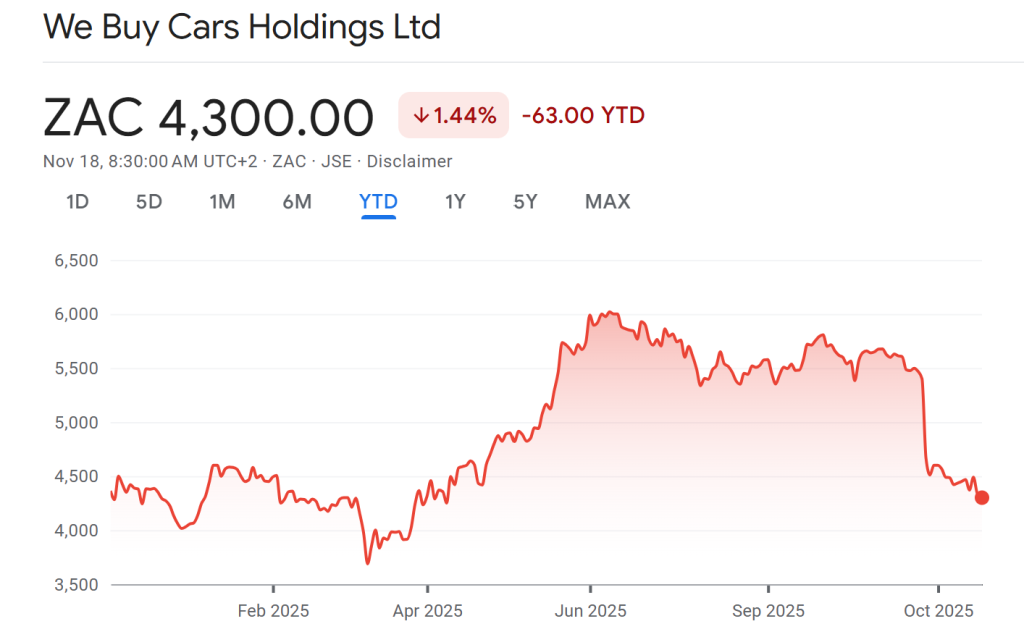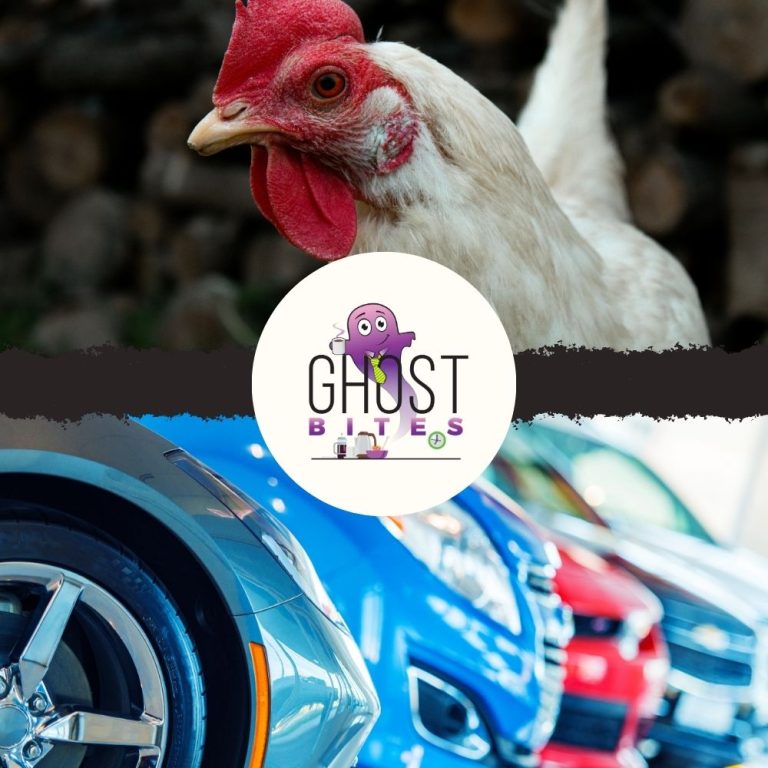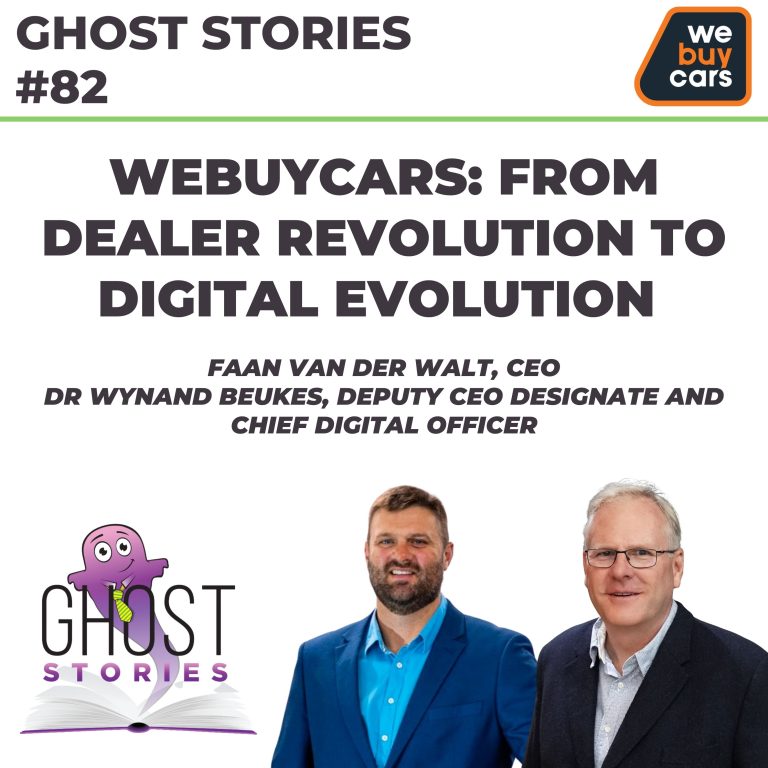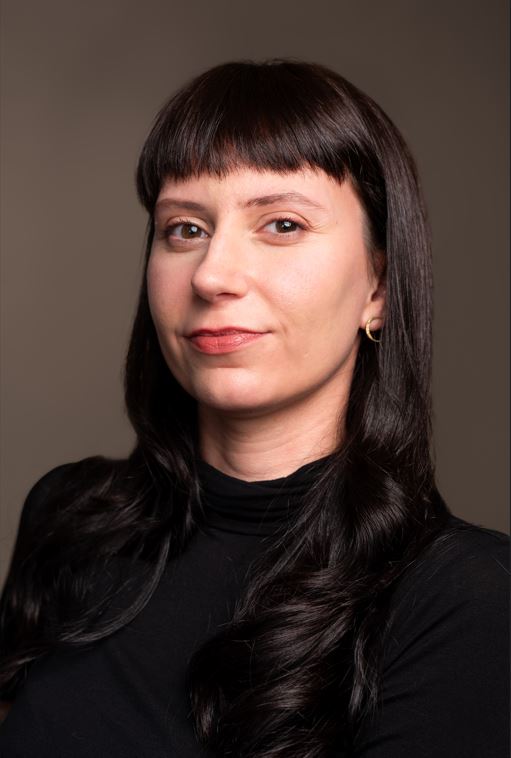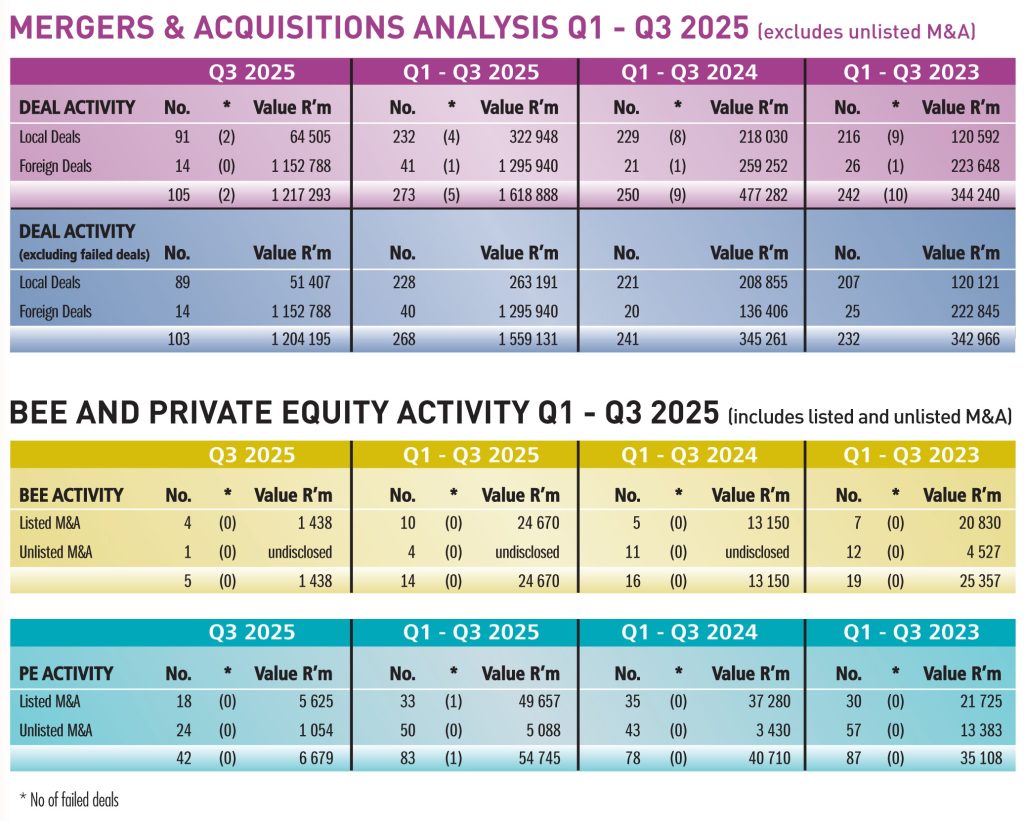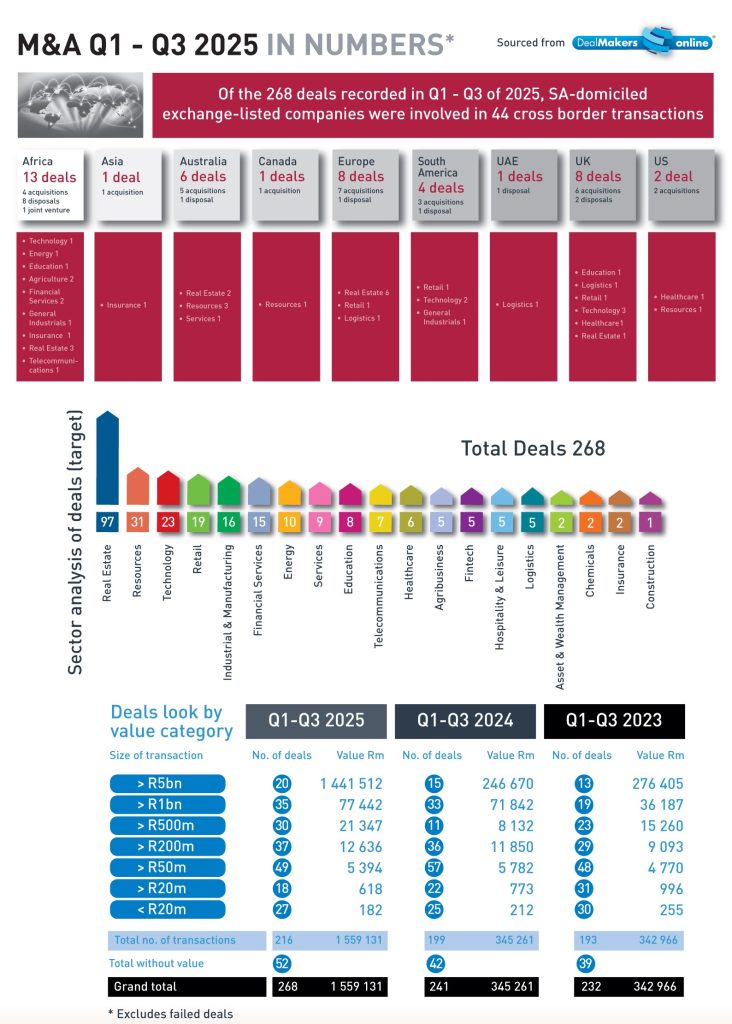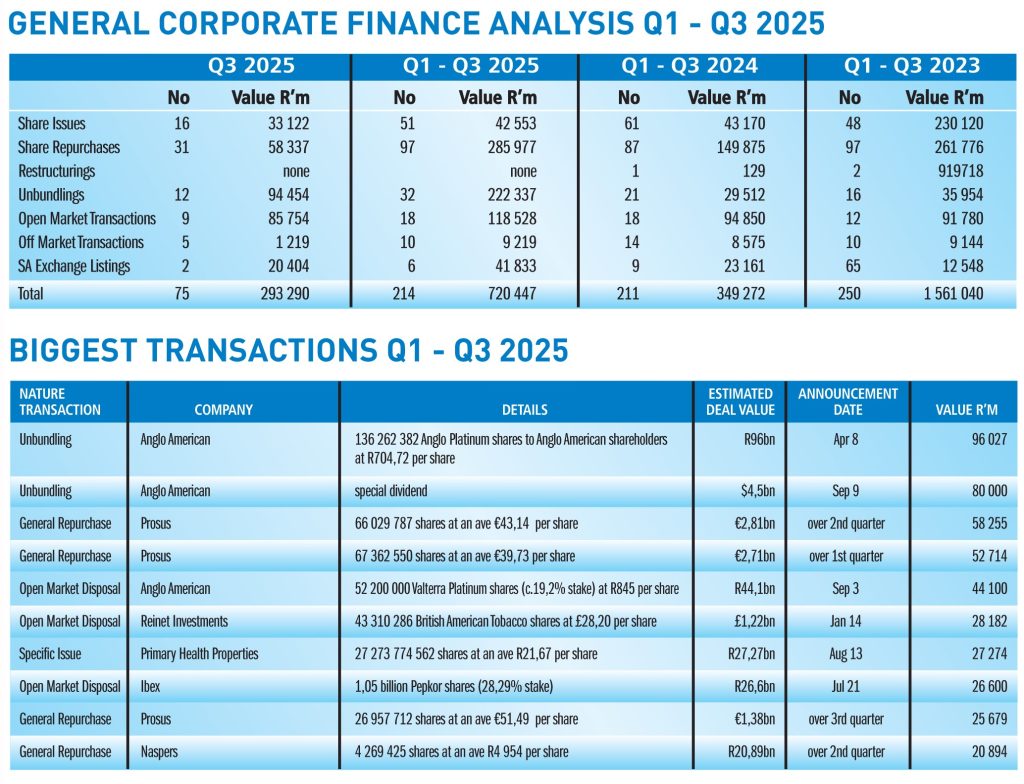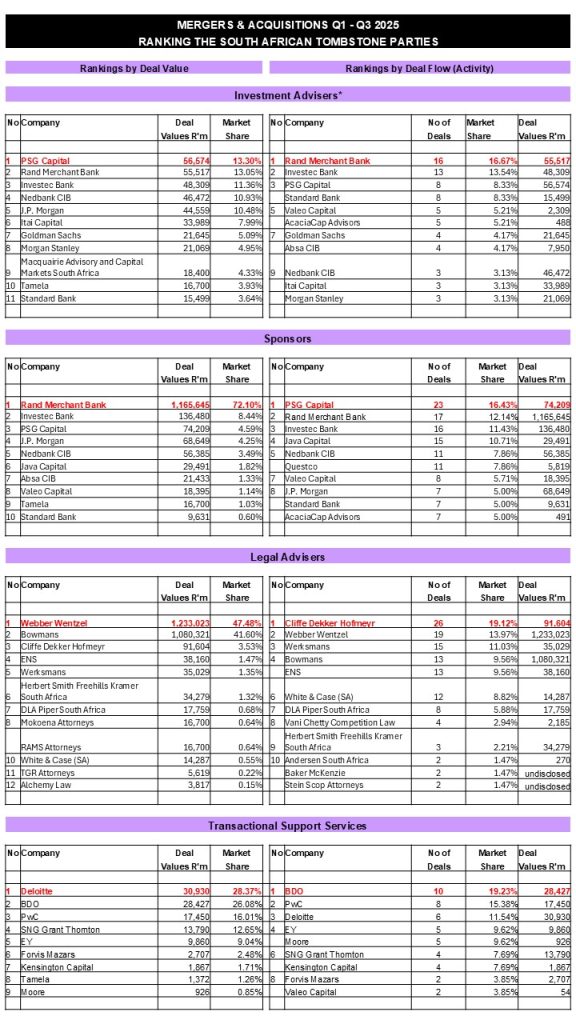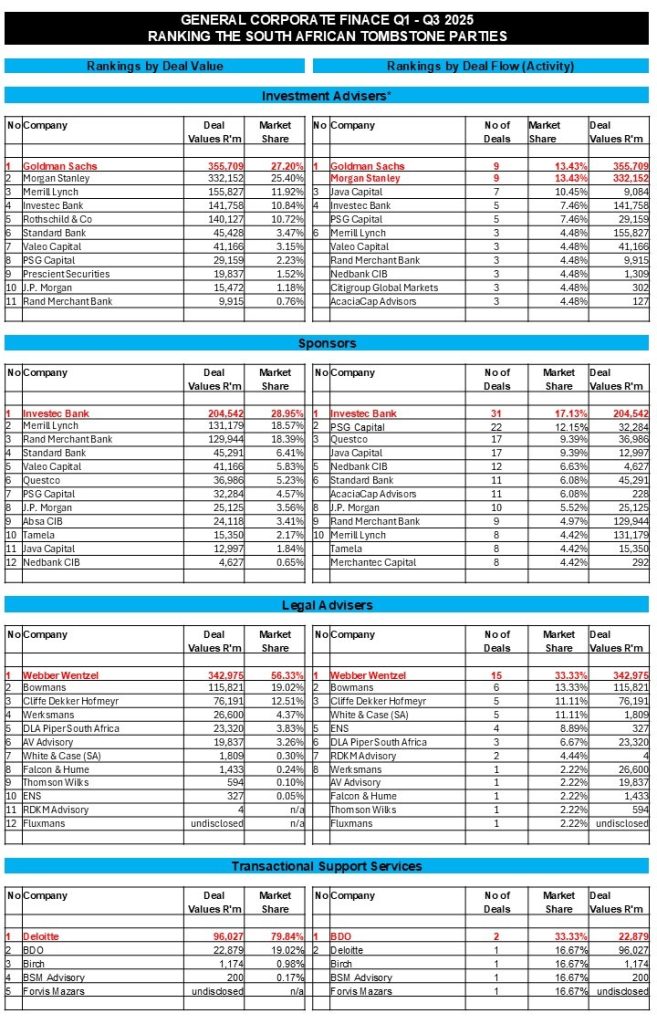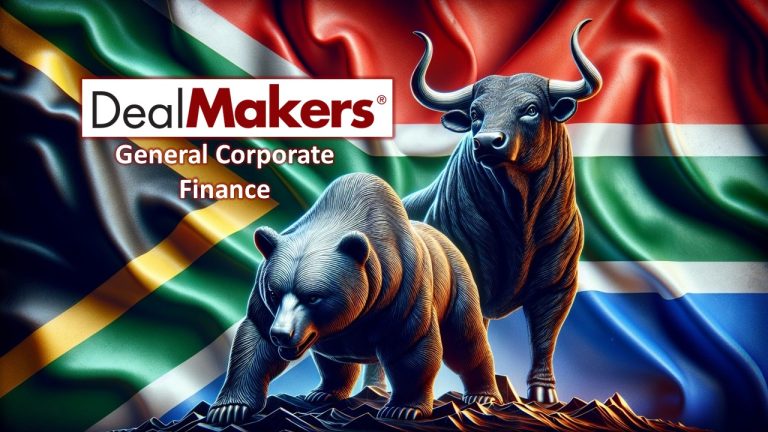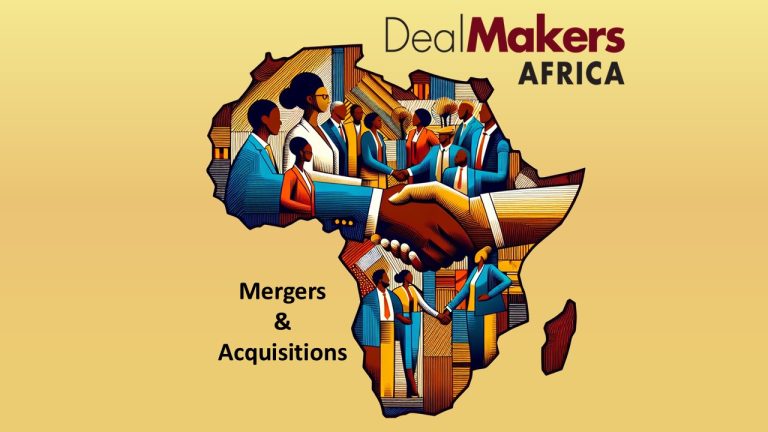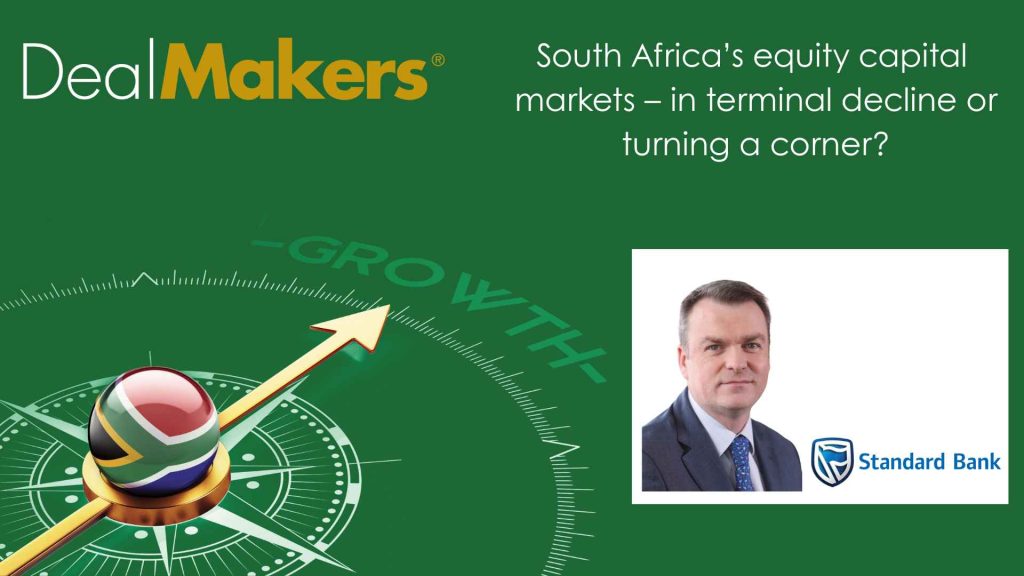WeBuyCars is an excellent example of a disruptor in the South African market, having completely changed the way people buy and especially sell their vehicles. Gone are the days of desperate listings in the classifieds and opaque market prices that are difficult to estimate. Today, the used car market is liquid and filled to the brim with data, thanks primarily to the scale achieved by WeBuyCars.
As a sign of just how valuable the data and technology systems are, WeBuyCars has announced that Chief Digital Officer Wynand Beukes will also take the role of Deputy CEO as part of succession planning at the group. CEO Faan van der Walt isn’t going anywhere just yet though – he still has plenty of energy to give the group.
In this candid discussion about the vehicle market and the business, Faan and Wynand joined me to discuss topics like:
- The succession planning at the group and what investors can expect from this.
- The significant changes in the local vehicle landscape and the impact this has had on used car vehicles and trade patterns.
- The flexibility in the WeBuyCars business model and how they use data and technology to buy smarter and optimise their operations.
- Opportunities related to value-added services and expansion of the footprint.
Please note that I have a long position in WeBuyCars at the time of this recording – a position that I have written about many times before.
This podcast has been sponsored by WeBuyCars. As always, I was given an opportunity to dig into the strategy and ask my own questions in my quest to learn more. You must always do your own research and speak to a financial advisor before making any decision to invest. This podcast should not be seen as an investment recommendation or an endorsement.
Listen to the podcast here:
Transcript:
The Finance Ghost: Faan van der Walt has been building WeBuyCars with his brother and team since 2001. Well over two decades later, the company has named Chief Digital Officer Wynand Beukes as Deputy CEO, a sign of intent around not just succession planning, but the importance of technology and data in the next chapter of the story. As always, you must do your own research, and please note that I do have a long position.
Welcome to this episode of the Ghost Stories podcast. I’m really lucky with what I get to do for a living, because I get to speak to the people managing and building some of the most interesting businesses in South Africa, and one of my personal favourite growth stories of recent years has certainly been WeBuyCars. Anyone who has followed my writing for any length of time will know that I am a WeBuyCars shareholder, so let me just get that disclosure out of the way. I am also a dyed-in-the-wool petrolhead, which may or may not have something to do with my WeBuyCars shareholding, but actually the truth of it is this is my only holding in the sector and there are reasons for that. I do really like the business.
I’m so looking forward to this episode. It’s based on an announcement that is really red hot off the press, so this is bringing you really up-to-date insights into what’s going on at the company. And who better to chat to than CEO Faan van der Walt and interestingly, iincoming Deputy CEO, Wynand Beukes. Welcome to both of you and I am very excited to be doing this with you.
Faan van der Walt: Thank you, Ghost. Nice chatting to you and exciting times indeed.
The Finance Ghost: Absolutely. Faan, let’s start with you and then we’ll pull Wynand into this. So, this is the classic journey for a founder-CEO, right? At some point you need to start handing your baby over into the capable hands of others. As a founder myself (of something very, very, very small in comparison to what you’ve built), I can just imagine what that journey is like. We’ve seen it play out before at other listed companies on the JSE. It’s always lovely to follow these kinds of stories and see what decisions get made around succession. And that’s really what has happened here.
So, before we chat to Wynand, why don’t you set the scene for us on that succession journey for you and why you believe that Wynand is the right guy for the job?
Faan van der Walt: It’s been a question for decades in my head: What would the future look like beyond my tenure as CEO? And the announcement we’re making is the appointment of Wynand as the Deputy CEO for a period of time until myself and the board feel that the time is ripe to hand over the reins.
Firstly as an entrepreneur, and I’ve said this many times before, but the ultimate test of entrepreneurship or a founder-led business is to let go and have the business maintain and grow beyond the tenure of the founder. So, that’s a goal of mine and my brother Dirk, who founded the business with us. And good examples are some of South Africa’s successful businesses, like Dis-Chem and Capitec, who managed to go through that. Internationally, you have the likes of McDonald’s. I’d love to see WeBuyCars succeed way into the future.
So, my role over time will change, but I will remain on the board and I’ll definitely remain a shareholder. I love being involved in the business. This is a proactive step in giving Wynand the chance to learn from me in more ways than what we’ve done so far, but we’ve already had a magnificent journey together.
About 8 years ago I struggled to convince Wynand to come and work at WeBuyCars. It wasn’t easy, because he’s quite a demanding person and he wanted to know what my vision was for this business! I had to explain to him the growth and the future prospects of this business. Since he joined, he’s developed a deep understanding of the business and the culture – which I rate as probably the most important thing in the business.
Operationally, he specialises in technology and developing systems and we’ve become more and more of a company that is dependent on that. So, I’m excited about the journey ahead. Wynand has proven himself over and over again as someone who has deep insights and also an entrepreneurial side – he loves experiments and is always full of ideas. With him around, I am happy to go into the future with him at WeBuyCars.
The Finance Ghost: So Faan, just for the benefit of listeners: those aren’t actually cell phone notifications happening there, that is your parrot. Your parrot has clearly learned precisely what cell phone and email notifications sound like, so kudos there to the official WeBuyCars parrot.
I guess it speaks to how many notifications are coming through all the time – not least of all from your digital man, Wynand, who will now be stepping into this Deputy CEO role. I want to get a proper understanding from him very shortly about what the digital world looks like, but a couple of things I just want to touch on from your answer there, Faan.
One, I can only imagine what it’s like to have created a legacy brand that all your competitors also put on their window. That for me remains the funniest thing about WeBuyCars – that basically every dealer these days just writes “We buy cars!” on their window. Like, “We also do! Come and speak to us!” It’s really, really funny. I’ve personally always gotten a kick out of that. I can only imagine for you how funny it actually is.
And of course they’re not always your competitors. Many of them are your customers, right? Because you sell a lot into the trade.
Faan van der Walt: Correct, yes. We have a very strong dealer base or dealer network who source their stock from us, and it’s been part of the journey from the beginning. When we started in 2001, the majority of the cars we sold were to dealers. We grew relationships with dealers over the years and today we have over 1,000 dealers who are registered and regular customers of WeBuyCars. So about a quarter of all the vehicles that we sell is to the trade. And it’s various dealerships – from the big OEMs all the way through to smaller dealerships dealing in the lower price ranges.
The Finance Ghost: Yeah, that’s something we’re definitely going to touch on later. So, Wynand, before we start chatting to you – any disclosure from you around exotic animals that are going to make interesting sounds, or can we blame any odd sounds on your recording entirely on you?
Wynand Beukes: Entirely on me.
The Finance Ghost: Okay, well it’s good to get that disclosure out the way, that’s very important. So Wynand, it sounds like why Faan chose you is because you came in, gave him a hard time and asked the tough questions. All jokes aside, if you listen to podcasts of great founders globally, they often talk about how much they value that. So, I’m not surprised actually. They’re not looking for people to just come and blow smoke literally, they’re looking for people to come in and ask tough questions – “How do we take this business forward?” and “Why should I be here?”. So, well done to you, you obviously asked the right questions.
And from my side, as an investor, I like the fact that you’re coming into this with a digital background. I think that counts for a lot because I would imagine, with taking the business from where it is today to where it can get to and what the future might hold, tech platforms, Big Data, machine learning, (dare I say it?) AI – that could be a big part of the future of the business, right? So, maybe you can just give us a little bit of an intro around how long you’ve been with the group – let’s start there – and then some of the tech capability that’s been built and what actually makes you excited about the future.
Wynand Beukes: Thank you, Ghost, and thanks for having us. I must say, I’m very honoured to step into this role of Deputy CEO and I’m genuinely excited about the opportunity to help lead this company into its next chapter. Having served as Chief Digital Officer since 2018, I’ve had the privilege of working closely with our executive team under the guidance of Faan.
Over the last eight years, I’ve had the privilege to be part of the amazing information technology and data science team to build our proprietary digital business platform. Spanning across the business, it serves as the backbone of our operations. Our platform integrates data, AI and experimentation seamlessly across the business, with a major focus on our data capabilities to evaluate the customer experience. I think that has laid a strong foundation for the future.
I think that as Deputy CEO, my focus will be on building on that momentum that we’ve built over the last eight years since we started with this digital transformation journey in WeBuyCars. We will focus on driving innovation, keep on unlocking operational efficiencies – one of Faan’s driving forces – and ensuring that technology continues to serve as a catalyst for growth.
At the same time, I just want to deepen our commitment to the customer’s interest here, across every part of the business. I think that ultimately our ability to integrate digital thinking with commercial execution will be a major differentiator for us in the market going forward. You’ve mentioned all the buzzwords in the sector: technology, data and AI, but that is here to stay. We’ll continue to adopt it, and that will sit at the centre of how we scale the business going forward.
Quite excited, nervous, but I look forward to working alongside the executive team, our employees and all our partners to scale what we’ve already achieved and to steer the organisation confidently through its next phase of growth. As we move forward, this is a solid technology platform that will continue to be a major driver for growth, helping us to innovate faster, operate smarter and hopefully deliver value at scale. Scale is the big play, going forward.
The Finance Ghost: The nice thing with this business is you can quite easily see the reason why having better data actually makes a difference, right? It lets you buy better; it lets you understand. You’ve got so many cars going through the system. I don’t think that anyone has a better dataset in the country about car values, buying habits, etcetera, etcetera, than WeBuyCars. I mean, this has got to be the biggest dataset, right?
Wynand Beukes: Exactly. That’s a huge focus and that was the beginning in 2018 when we made a decision to insource the digital business platform – to build it ourselves in-house – and there were two principles based on that decision. The one was that we wanted to be in control of the software, firstly – we wanted to be agile, quick, and if we had to make changes we had to be able to make it quickly to adapt to market conditions.
And the second thing was we wanted to be in control of the data and the quality of the data. So we had – when we started building a team up from some of the first people that we employed – not only developers, but data people: to walk the journey with us and to make sure that our data pipelines are clean. It’s that old saying “garbage in, garbage out”, and we wanted to make sure that we get the data, we store the data and we utilise data.
I think the difficult thing about data is to operationalise it. Many companies have lots of data. The question is: How do you use the data to make decisions, and make them faster and faster and more precisely, with the same amount of people? This is a difficult question to answer, for many companies.
The Finance Ghost: Yes, absolutely. And it is the question that is being asked of everyone now, so it’s going to be fun to see how this turns out. Faan, from your perspective, you’ve been doing this for over two decades now, so you’ve seen a fair bit in this industry – from very humble beginnings in this business to the monster that it is today. But I wonder if you’ve seen anything like what we’ve seen in the past couple of years, with this influx of Chinese and (to a lesser extent, but still material) Indian brands that have suddenly won so much market share.
I have found it absolutely fascinating to see how the legacy brands have been given a little bit of a hiding, let’s be honest, by some of these competitors. It’s looking pretty dire for some of these European names. And, as I said at the start of the show: dyed-in-the-wool petrolhead and WeBuyCars shareholder – why do I not have shares in any of the other companies? And that’s because I was very worried about what it would be like for them, representing brands when things are changing so rapidly in the space. And kudos to them, they do seem to have done a pretty good job of navigating that in New Car land.
You guys are obviously only operating in Used Car land (and please do stay there, because that is certainly, I think, a large part of the investment case – so don’t be tempted).
Faan, from your perspective in terms of this Chinese influx and everything that’s happened. I mean, you are right on the inside. You can see what’s happened to car values, what effect that’s had. I’d like to open the floor to you to maybe just walk us through what you’ve seen in the last year or two. Have the legacy brands had accelerated depreciation? What has this meant for your business, especially in the latest period? Because I know it did have an impact in the latest numbers.
Faan van der Walt: We have certainly seen an impact in recent months, but it’s not something new. The first time I encountered this was in 1996, so it’s about 30 years ago when we saw that.
Back in the day you didn’t get a Toyota Tazz, you had a Toyota Conquest and they were selling for just over R40,000 in 1996. And then, Toyota brought out the Tazz which was a more value-based one, only four-speed (the Conquest was a five-speed) and it really slammed the market for their competitors – the Mazdas, the Ford Lasers, and so on. So, that was my first encounter because I sat with one of the…
The Finance Ghost: Sorry, that is such a nice memory. I was just going into primary school and I remember that my cousin got a Tazz. That was a big deal. That is a great memory, actually. Cars have changed a lot.
Faan van der Walt: Yes. So, I’ve had personal experience of taking some pain at points in time, but sometimes it works in your favour. Like we had just after COVID when, with the supply chain issues, used-car inflation grew dramatically and vehicles actually went up in value. It was a great period for us, because we could trade cars, everyone had equity in the vehicles, it was really easy. And then the year after…
The Finance Ghost: It’s what it’s like to be a nursery, right? Your stock grows in value every day, you don’t even have to water it during inflation like that – it just goes up.
Faan van der Walt: Yes, sometimes you have headwinds and sometimes you have tailwinds. So the year after that, when the new cars came in again, we saw that deflationary effect again. And we’ve seen some of that this year as well, and especially on the fairly new vehicles. Fortunately for us, the average car we sell is about nine-to-ten-years old and we do have these impacts. For instance, right now we’ve seen accelerated depreciation on some of these legacy brands.
I was in a shopping centre and there was a Jetour standing there for R480,000, brand new, being displayed. I looked at our website and I saw that we’ve got a very similar one that’s a year old that we are selling for R410,000, so that’s about a 20% depreciation a year later and 25,000 kilometres later. So it’s a normal depreciation that this vehicle goes through, because the moment you leave the floor, that’s 10%, and usually you can calculate around 1% per month.
So for us, yes it did impact us over the financial year. We could certainly see, in certain categories and price points, that new car supply pushes down used pricing, and then you have margin pressure. So how do we handle that? Obviously, our model is built for velocity. So, we have the luxury of being able to adjust our prices dynamically to market conditions. And that’s exactly what we’ve done. So, in areas where we saw that overlap, we could adjust and liquidate stock and utilise those funds in price ranges where it’s not affected. And we could be more aggressive there.
The Finance Ghost: Just saying velocity reminds me of those Citi Golfs. So I had a Corsa Lite, I was more on that side of the fence than the Citi Golf Velocitis. But it was such a simple time in the world. There were only a few new cars at a time. They would come out, and there would be one (like you say, the Toyota Tazz or the Conquest, or whatever) and it would be, “Are you this one or that one? Is it Ford or VW? And now there is just this incredible number of options.
The car culture has definitely changed, that’s my read on it for sure, over the past few decades. It’s more competitive now, I don’t think any of the legacy brands can really rest on their laurels at all. I mean, you’ve just used that perfect example of these Jetours. There it is with much the same depreciation curve that you’re going to get on a new VW. You’re not going to get a premium on the German car, used.
And I think what’s interesting is you mentioned the nine-to-ten-year-old average. And that’s a big part of the business model, right? So not only are you built for velocity and basically getting the stuff out the door quickly, but you’re also buying stock at a point where the rate of depreciation has slowed, dramatically. I mean, would that be an accurate statement that that is definitely part of the business model?
Faan van der Walt: Well, sometimes they start appreciating again. A typical good example is the Nissan NP200, which is currently on an upward trend – especially the ones older than five years. So, you cannot rely on book values at all.
It’s a mess when you look at book values, but this also creates a problem for insurers and banks on which we want to finance that, because the dealers (and us included) sell them way beyond what the book value would be and they still go up in value. A year ago, we would sell a six-, seven-year-old Nissan NP200 typically for R110,000, but now the same car you would find on our floor for R125,000 to R130,000. So yes, it’s true. They slow down depreciation, but they can also start appreciating.
The Finance Ghost: Yeah, the Nissan NP200, the Nokia 3310 of bakkies right there. And people like to hate on buying new cars, and I always have these fights online. So, the newest model car that I have personally ever owned is a 2015. And I bought it basically new at the time, and then regretted it severely afterwards because it had electrical issues from day one. It’s a sad story and not even an exciting brand – that was the worst part. I bought a sensible car. I think that is the only sensible car that I have owned of the 20-plus cars that I’ve owned in my life. So, it just goes to show: buy something pretty and then at least you’ll be able to forgive it when it breaks. Anyway, that’s just the problem with being a petrolhead.
But Wynand, maybe back to you on how you see this play out in the inventory strategies, the buying strategies, etcetera. Again, I would imagine that this is where the data makes a big difference, right? This is where you need to be monitoring depreciation curves, I’m guessing also stuff like hits on the website, to try and gauge the demand for these vehicles. I can just imagine how much data you have to look at, because such a big part of your business is online as well, right? And you can just measure so much.
Wynand Beukes: Ghost, to be honest, we collect data on every touchpoint with a customer. If you asked us our vision a couple of years ago, it was: “How do we own or control every touchpoint with a customer?” And that statement just comes down to the fact that we just want to collect data on every point. And we use that all as input to our datasets and into our price models, to recalibrate and retrain these models to give input to pricing, sales channel optimisation, inventory turn, stock turn, stock days, stock mix in branches and provinces, for example. All these factors – market analytics of all the listing platforms – we take all this into account to make sure that we get to accurate decisions for velocity.
That’s what we build for and that’s what the business is built on. We have to use all this data – from clicks on the website, views, number of checkouts of car keys, for example, number of test drives – everything gets taken into account. So we’ve got huge datasets where we’re collecting many, many gigs of data every day. And that is no small task: to process all that data and to operationalise that into your business, but I think that we’ve done that well and I think that we have a good foundation going forward…
Faan van der Walt: Sorry Ghost, you would find this one interesting. Wynand also collects the data of which radio stations are in the presets of the car radios, and that helps to inform where we do our radio advertising campaigns. So right now we’re on over 30 radio stations, but sometimes you see many cars coming in with certain radio stations tuned to, but we’re not advertising there yet. And it then shows you, “Hang on, a typical customer might listen to Metro FM.” And then you’ll approach them and start advertising there – which we recently did, by the way. So, it’s an interesting one.
The Finance Ghost: It’s clever data. We joke about it, but that’s actually quite smart. And I think Wynand, it’s basically stalking at scale, right? It’s understanding as much as you can about all your different types of customers across all your different regions and what they’re interested in and what types of cars.
Because it’s a very personal thing – much as car culture, in my opinion, is not what it used to be unfortunately, especially on the entry-level stuff. I think there was a time in the world where, if you were an entry-level buyer, there were still a lot of different cars to choose from that said something about you. It does feel that everything’s become a bit sanitised now, there is a lot of sameness, but still, you know, it helps to understand the colours of cars that people like and all of that kind of thing. It’s a big part of what you need to be doing.
And the other area where I have seen much of this process, coming through my own experience having dealt with WeBuyCars just in the day-to-day… I remember a few years ago if you sold to WeBuyCars it always felt like it kind of depended who you got on the day, a little bit. It wasn’t necessarily the exact same process across the board, that was my experience at least. And then my soon-to-be mother-in-law sold a vehicle to you guys probably about a year ago now, year and a half. I remember helping her with it and I was super impressed because it was so process-driven. Like the buyer had a proper list of stuff that needed to happen and actually picked up things on the car that I didn’t even know about, you know, little paint issues there, oh maybe there had been something there. It was very, very impressive.
It was definitely at least as good as selling a car to a supposedly premium new car dealer with a fancy showroom, if not more thorough. And that for me, I remember saying to him – and it was probably the strangest comment he’d received all week, your buyer – “As an investor, this really pleases me, as you sit here and mark down this car.” I’m not sure that my mother-in-law liked that part so much, but it definitely pleased me as a shareholder to see that level of thoroughness.
Wynand Beukes: Yes, Ghost, that is a very good point. If you turn the clock back to 2018, I think that one of the biggest risks for the business was Faan himself. If a bus drove over him, then we were in big trouble, because he understands vehicles, and the market, and the service so, so well and has been doing this already for so many years. We had to get to a stage where we thought:: “How do we create at scale a repeatable process to be consistent not just in Gauteng but across the country as well?” And that’s exactly what you’re referring to.
So, we’ve worked very hard on the buying process to get our pricing models correct, and give a consistent customer and user experience across the board. It doesn’t matter if you’re selling a cheap R50,000 vehicle or a R2 million vehicle, we just want to make sure that we provide an excellent service to that customer at a fair market price and provide him a service and buy that car as quickly as possible.
The Finance Ghost: Yeah, basically it’s FaaS, right? It’s Faan-as-a-Service. That’s what you need to roll out across the entire business, is a lot of people with Faan’s understanding of the market out there doing what Faan has done to build this business up with the core team around him. So yeah, that is the journey of a founder-led business, particularly a disruptor – and particularly a business that I think is doing things differently, which is what WeBuyCars is.It has certainly been a disruptive force in the market.
People forget quickly. I remember what it was like to have to sell a car on Gumtree – the bid-offer spread on every sale was insane. You were really lucky if you were offered a decent price on that car. Especially if, as in my case, I was mostly selling a high-mileage Alfa Romeo, which is sometimes easy and sometimes very hard. And then WeBuyCars came along and there was just this floor price put into the market of, “Listen. You now don’t actually need to accept a ridiculous trade-in offer because you’re desperate.” Or those forced sales on Gumtree of, “I’m emigrating and I desperately need to sell XYZ.” I remember those days because I used to take advantage of them as often as possible – that’s why I used to change my car more often, because the market was less efficient, bluntly.
Whereas now – so I can blame you for this actually – the market is a lot more efficient. That bid-offer spread has closed, those desperate sales. If you’re emigrating, you can now drive your car to WeBuyCars. And as a result, I think other players in the market have been forced to start making more competitive offers when buying vehicles, right? I mean, that’s surely something you’ve observed as well. They’ve had to come to where you are because that’s just the reality. It’s pretty easy for a consumer to cross-shop and come and take the better offer.
Faan van der Walt: Yes, 100%. The whole offering has really transformed the market for both consumers and dealers. I recently met a dealer – and in the past dealers would say to me, “Oof, you’ve killed our market.” But the clever ones have caught on – and this specific dealer told me that, since we’ve opened in Rustenburg, his business has started booming because he can now easily offer his clientele good trade-in offers. Because when someone wants to sell him a vehicle, he takes it to WeBuyCars, he gets a good price and then he can decide whether he wants to keep the car or sell it to us. So, the client gets a great deal and he gets to sell his car that he wants to sell.
So quite often, dealers are very brand-conscious and brand-specific and they don’t want to trade in different brands and, what they call “contaminate their inventory” with foreign or alien brands. They would contact us directly and they can rely on the prices that we give. So it’s been good, and it’s become more reliable, it is more reputable.
And what we also see is that people tend to churn their cars quicker, if they don’t depreciate as much, when they get good deals. So, I would love to see cars churn more. That would really stimulate the industry because the more deals we do, the more opportunity there is to make money.
But also, getting a new car is an exciting part of your life, it’s like going on a holiday. And we see people buy a car from us and bring it back 6 months later, 12 months later, and buy something else. And it is not as if there is something wrong with the vehicle, it’s just that they are happy to take R10,000 or R20,000 less for that vehicle now, once they’ve used it a year, and buy something else. Getting something more exciting or something newer, lower mileage. They can make these upgrades (or downgrades, if needed) far easier than before.
The Finance Ghost: It’s like buying and selling shares. If the costs are low, then people do it more often. The reason people don’t buy and sell their homes very often is because transfer duty and estate agency fees are enormous. Those are the two extremes – somewhere in the middle is buying and selling cars. And I guess the more efficient you can make that process using tech and other methods, then the more people will churn. I mean, this is human behaviour. I tend to agree with that. That’s exactly the behaviour that will happen.
What is really interesting is when you speak to people in the market and sometimes people make this cheeky joke, “It’s called WeBuyCars but are they selling cars?” And then they’re almost trying to look for ways to dig holes in this business model. Unfortunately, success does tend to attract a bit of jealousy in the market, and people getting angry and looking for issues. That’s just the reality of life, unfortunately.
And the one thing that does often come up – and this is what I wanted to ask you about – is the perceived quality of the vehicle sometimes gets referenced by people who are looking for things to criticise. They point out, for example, “Are the DEKRA checks really that independent?” I’ve had my own experience, looking at cars from WeBuyCars, versus other dealers, which I’ll share after you answer this question. But from your perspective, how do you protect the customers, and how do you respond to those perceptions around quality, the relationship with DEKRA? And this is obviously very important because, at the end of the day – if you can’t sell the cars, you’re not going to be buying the next one. So, when this stuff comes up and you see people making these comments, how do you tend to address them?
Faan van der Walt: This is a great point. We want to be as transparent as we can be and upfront about the condition of every car we sell. Now, taking into consideration that we serve the whole market and the average age and kilometres of the vehicles which we buy and sell is nine years, 140,000 kilometres – there will be cars that you’ll have with issues. We really try to steer clear of cars that are unreliable cars, that could give problems, because it might break while we have it and then we sit with it.
The Finance Ghost: So, no more Land Rovers anymore, Faan? I’m assuming no more Land Rovers are coming through the doors at WeBuyCars, right?
Faan van der Walt: Look, Wynand can also elaborate that. But he implemented a loss-avoidance strategy because, from our data, we know that certain vehicles (sometimes even 40% of the time) break. I’m not going to name and shame certain brands right now or certain make-model combinations, but we just steer clear of those, or offer very low prices so that we know if this car comes in, we can repair it and we can make sure and we can cover losses if there’s an unhappy client afterwards. Those are few and far between, but the data does help.
Regarding the DEKRA test, and what I did not like about the DEKRA test, was that it’s very technical. Even for me, I sometimes couldn’t understand what the fault code is, or what the explanation is on something that might be wrong with the car.
So, we’ve very recently launched a new brand, which is an in-house brand, called Inspectify. What Inspectify does is that it replaces the old DEKRA service or test, and we have it audited independently, because you don’t want to get a situation where someone says that you’re writing your own exam, or you’re marking your own exam. So, the independence of this brand is important to us, and I guess that time will tell whether we’re getting it right.
But, it’s plain language and easy to understand for the average consumer. Wording things like “this is wrong”, or “that is wrong”, or “this might need attention”. But, going beyond that, also explaining what a service might cost, or what ownership costs would be for a vehicle, or even fuel consumption. We have a chatbot that Wynand’s developed on the website called Orange, that when you’re purchasing a vehicle, you can ask it, “I want to drive this vehicle from Joburg to Midrand every day. Could you tell me what fuel would cost me per month?” And it can do that for you. So, it’s quite clever technology built in there, all in an effort to serve clients better.
So, it’s always a work in progress. The way you see WeBuyCars today is not the same as it would be in six months time. People contact me and say, “You should improve this, you should improve that,” and I say, “Yes, yes, we are busy with that. There’s a whole pipeline of development that we are busy with.”
The Finance Ghost: Yes, my tongue-in-cheek jokes about Land Rovers aside. Shame, my brother had the stereotypical Land Rover ownership experience, so I can make the joke. But there is actually a serious point behind that and this is the experience that I wanted to share why I feel good when I look at cars at WeBuyCars honestly: it’s because you actually do have that level of disclosure.
So, we all know that some cars are more reliable than others without going brand by brand – it’s obvious, you can Google the stats and you can see for yourself. Reputations are what they are for a reason. There’s a reason why people buy white Toyotas and there’re reasons why people take risks on red things from Italy sometimes, or green things from Britain. And you’ve got to just understand what you’re buying and why you’re buying it. I think that’s the overarching point. And that’s what I’ve always liked about those reports: you understand what you’re getting at the price point you’re getting it.
That car that I referenced earlier, that 2015 that I bought, that was an absolute “you know what” straight out of the box – it was a Kia. It was the one time in my life that I bought a sensible car and it was a Kia and it was a reputational disaster and just unforgivable.
And so, it just shows – it doesn’t matter which brand you buy. They are machines, they have lots and lots of different components. Something can go wrong. It is what it is. And I think if you’ve got the data, if you’ve got the clarity of the report, then that actually helps a lot. Because also my experience of buying from supposedly really good dealers – and someone in my family had this experience very recently buying from a dealer up north, which I will not name. It was definitely not WeBuyCars. You buy something, you think it’s fine, but you’re not getting the detailed report that comes with it and then the problems start.
Now, if you’re lucky, the dealer will behave well. And maybe they will do what they are supposed to do by law and sort it out, etcetera, etcetera – but it’s a fight. You might have bought that car from somewhere else in the country, depending on what it is and where. It’s just an unpleasant experience.
That’s the one thing I really like with the WeBuyCars model: at least you know, day one, you’re buying this thing – it has problems or it doesn’t, but at least you’ve got the grading system. You can then budget accordingly for “how much money do I need to spend on this thing or not” and so I guess that’s part of it. It’s actually just transparency. It’s not about saying, “Of the many, many, many thousands of cars that we sell, every single one is perfect.” No, that’s not your business model. I think that your business model is to say, “You’ll understand what you’re buying.” That’s really the point, right?
Faan van der Walt: 100%. We’ve simplified that by grading it and indicating which cars we deem as roadworthy and ready to use versus something that’s “take a note of point XYZ” – which could be as simple as, “Listen, it needs a set of tyres and windscreen wipers.” To a more serious thing, like an oil leak, that could range in cost of repair. But it’s all disclosed there.
The next step for us would be to also help the customer in understanding how much it would cost to repair those repairs, which is something which we hope to implement in the year to come.
The Finance Ghost: Faan, that certainly does sound interesting. I can imagine a world in which you can say to your customer, “Here’s the estimated cost to fix.” I like that. I can already see the partnerships coming through of who might be fixing it and what the economics of that might look like. Again, the shareholder in me is quite pleased to hear that.
I’m going to flick back to Wynand now, because as we talk about the economics of the business and value-added stuff – that’s just a hypothetical example for now at least, what would it cost to fix. There are other value-added things that you’re doing in the business that are happening today, and that’s stuff like financing, for example, and other things. The scale that WeBuyCars has achieved now – you are an incredible distribution arm for products.
I looked at EasyEquities / Purple Group this past week and I spoke to the CEO there, Charles Savage, and talked about how strong that business is now, from a distribution perspective. They have over a million active accounts. They’re like this dripping roast for financial services product providers wanting to get to their user base. And I can mention them here, of course, they don’t compete with you in the slightest, but I almost see similarities. You’re both disruptors, I’m a shareholder in both – for actually very similar reasons. And if I look at your business now, this huge number of cars going through the system, again, very strong distribution, understanding of your customers – that becomes a really powerful distribution-type business.
So, Wynand, from your perspective, and I guess the data ties in here beautifully as well: What is that second gross opportunity, as I understand they call it in the industry (if I’m getting it wrong, tell me)? It’s the opportunity for car dealers to make more than just the initial gross margin. The basic, “I bought a car for R100,000, I sold it for R110,000.
What do all those other opportunities look like and how are you responding to them?
Wynand Beukes: So Ghost, that’s a very significant line on our income statement, our “second gross”, and it’s all about the distribution, like you mentioned. We finance about 20% of our vehicles of our total full stockholding per month, and that’s just north of about 2,700 vehicles per month that we finance. And then we get income from the banks on that – they call it a Variable Incentive Commission and a Dealer Incentive Commission for every finance transaction. That had a great impact on our income statement this year. We grew that by 14.5% in FY25, which we are very proud of. And on top of those finance deals, around 2,700 a month on average, we sell product as well. We average just over three products per every finance deal.
If you talk about opportunities in WeBuyCars and how to grow that second gross income line, as well documented, we’re aiming to do around 23,000 vehicles by FY28. And, if we maintain that 20% penetration on finance deals, our second gross line will be significant in 2028. So, very excited about that.
We do a lot of work to make sure that we get financeable vehicles as one of our big sales channels and we use data for that. How do we use our models to get the probability of finance? Because we have different channels to the floor for a vehicle and we use probabilities. We see that this is a very good financeable vehicle and we want it on the floor, then we’ll channel that vehicle to the floor rather than sell it on auction, for example. Because that gives you the opportunity to get second gross income and sell more product. So, we keep a close eye on that and we will monitor that and grow that with the business as we scale.
The Finance Ghost: Yes fantastic, this is really interesting. Faan, I think let’s talk about the expansion of the trading space. Because, at the end of the day, you need space to sell cars and get your second gross and all these other wonderful things.
WeBuyCars very much started in busy urban areas, which makes a lot of sense, and I think you’ve found a lot of interesting ways to grow in more outlying areas. You’ve got those buying pods, you’ve got other innovations, you’ve built out a national footprint in quite small towns as well, for a business built for churn. That’s why you’ve got to be where the people are, and then you’ve got to be careful when you expand beyond that, that you don’t go and build out space that doesn’t achieve the throughput that you need it to achieve.
So, from your perspective (especially since you’ve been there since literally the beginning), how has that expansion capex thinking changed over time? What are some of the typical things that you consider now when you are adding space to your business?
Faan van der Walt: It’s a great topic and we talk about this a lot, internally. We don’t use specialists to tell us, “Oh, you’ve got to go and open a branch in Kimberley.” By the way, I’m thinking of it – I was there over the weekend and it’s a very lively town. We look at various things: the sourcing potential, the logistics efficiency. We didn’t have a pod in Springbok for a long while because it was terrible to get cars from there to the nearest supermarket. We do clever things, like when we rolled out our pods nationally, we looked at where all the Toyota dealerships were. Because that’s a very good indicator of enough economic activity to sell Toyotas there, and that means there’s used vehicles there and we’d love to buy them.
The business is like a two-sided coin: you’ve got the buying side and the selling side. So, the buying we do all over the country. And that’s mainly by placing buying pods in strategic locations all over, so that when whoever wants to sell their vehicle, they can have the service straight away. And then, when it comes to the larger warehouses, we have smaller ones and bigger ones. Most recently we opened Rustenburg in October last year. It’s doing really well, selling around 400-plus cars per month. More recently, we opened the Vereeniging branch a few months ago and that really surprised me. The demand and how well it did since inception.
And then, looking forward, still this year we are going to open two really big supermarkets: one being in Lansdowne in Cape Town and the other being in Montana, Pretoria North. Now, these branches are mega branches. They will both probably be our second biggest, next to the Dome, and those are in the big metros. So, we believe that there is still a lot of growth for us to be had in the big metros. We’re not veering into the more rural areas because we feel we are being saturated in the big provinces – no, not at all. For us, these two big branches generate space that is desperately needed and it will help us to sell more stock where they are needed. But that’s it. We are also looking at Witbank, or eMalahleni – we’ll open there probably February or March. Also sizeable, enough space for around 500 cars – so could potentially sell 500 cars.
So, yeah, slowly but surely we are expanding the footprint. I would have loved to have been able to open one of these two big branches earlier this year. It certainly would have helped us, because we were buying cars at such a pace that our stock levels went over 100% which also influences your pricing decisions.
It’s a disciplined process going through that. We don’t open just because we are cost-conscious. We’re looking for the right deals in the right places. By way of example: Bloemfontein. I’ve been wanting to open in Bloem for two years now. We are getting there, but we just haven’t found the right deal, because we are cost-conscious when it comes to how much it’s going to cost per vehicle you’re selling there. We’d love to sit at below R1,000 a vehicle. In some of the most expensive locations, we’re north of R1,500. But, we’d rather veer away from going into a very costly lease just for the sake of having the footprint. It’s got to make sense and pay its way.
The Finance Ghost: Faan, I heard you say Rustenburg there a year ago, which means that you basically called the platinum cycle. Which is incredible. Because no one knew when platinum was going to start rallying, and you called it; you opened in Rustenburg. Is this what’s happening here? Is Wynand being set up to take over from you so that you can go and run platinum mines and try to get the platinum cycle right – is that what’s next?
Faan van der Walt: No, just at look at where we are opening and look at what industries are there and just back them, and then you’re going to become filthy rich (laughing).
The Finance Ghost: There we go! He makes it sound so easy, Wynand. Does he always make everything sound so easy? Capex included?
Wynand Beukes: I think just something I want to add onto what Faan has been saying: apart from the selling opportunities with expanding your footprint that enhances and elevates our buying process, is buying as well. As soon as you put down a warehouse in some location somewhere, you just buy more vehicles there, as well. It’s a great billboard. We’re looking forward to Montana, Lansdowne opening, and looking forward to how many cars we are going to buy there as well. Consumers like going to the warehouses to sell their vehicles. So yes, we are very excited about that coming at the end of the year.
The Finance Ghost: Yes, one of the great learnings there for me was just splitting the buying and the selling. I think that’s so clever. There is a Toyota dealer, there is enough activity, there will be cars for us to buy, even if we can sell them somewhere else. Very cool.
And that leads nicely into the last question that I want to ask you. It’s a fun one. It’s very much based on – so of my two best mates in the world, both are car guys (that’s essentially how we all met) and one of them at one point sold WeBuyCars this beautiful classic Jaguar. And I was genuinely astounded at the price which he got from WeBuyCars for this Jag. I thought to myself, “Wow, okay. Good luck, WeBuyCars, I’m not so sure how this is going to go.”
And that made me wonder, on a serious note though: is the business model that absolutely every single car must make a set profit? Or do you have exceptions where you say, “Hang on. Actually, having a 1950-something Jaguar in the entrance of this large supermarket kind of gives a pretty interesting impression as people walk in.” Because I have noticed – maybe I’m speaking for the one near where I live, which is the Richmond branch – every time I go there, I get to see this row of just very nice cars near the door. It feels like the pretty stuff is in front, and it doesn’t feel like an accident. So, as a fun question to finish, I really wanted to understand: Is there a “prettiness factor” in the pricing model?
Faan van der Walt: Well look, it is deliberate. We certainly love interesting cars, but we are still a disciplined business and so every car must also make commercial sense, too. That said, unique cars do add energy to the floor and it does create a destination experience. Especially in upmarket areas – people love walking the floors with their family, so it has to be interesting.
No, we won’t overpay for them, but you might not make the same profit that you would on a quick turner. So, some of these do take long to sell, but I love them. I love old cars. I’ve got my own collection as well, so it’s not done purely for decoration.
The Finance Ghost: No, I can believe that it is a bit of both. That was kind of my expectation. That there was an element of, even if you just break even on that one, the fact that so many people would walk in and look at it and talk about it and take a photo of it and, “Wow, do you know I saw this thing at WeBuyCars and it was so nice.” It does actually help with the brand, so I think it is the right play.
I think that’s about as much time as we have for this discussion. It’s really been super fun. Faan, Wynand, thank you so much for your time. I’ve really enjoyed it. I remain a happy shareholder. I know that the latest results, you know, the market’s had some views on digging into the numbers – go and take a look. But for me personally, I think the strategy is still very sound. Businesses don’t go up in a straight line every single year at exactly the same percentage on exactly every item on the income statement. The only way you’ll ever believe that is if you’ve never run a business yourself.
It’s been an incredibly impressive story to build WeBuyCars in the way that you have. All the best for the coming year, 2026. I hope to do another one of these with you at some point. And thank you for making time for the Ghost Mail audience on this podcast.
Faan van der Walt: Thank you, Ghost. Great speaking to you!
Wynand Beukes: Thank you, Ghost. It was an honour. Thanks.
